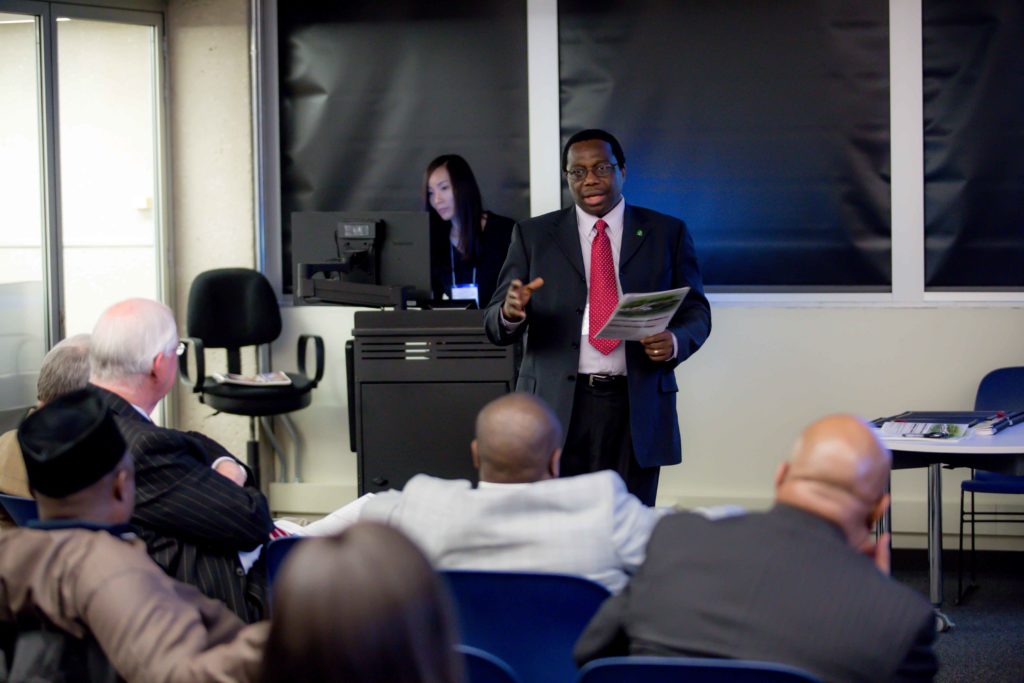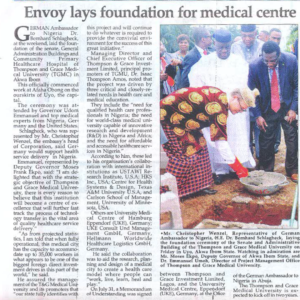
Emmanuel Umoh, PhD, MSPM, PMP, has always been an innovative and logical person. With the belief that project managers also need to be visionaries, he’s determined to see all projects through, in the most successful and cost-effective way. His experience in the software engineering field led him to become a project manager, in which a large portion of his career included modernizing airport baggage handling systems for a major airline company. His contributions were adopted in multiple locations and ultimately saved the airline company millions of dollars.
Emmanuel currently runs his own consulting firm, XEQ Consulting Solutions LLC, which helps businesses navigate digital transformations and find solutions to carry out successful projects.
Emmanuel spoke with us about his path to project management, what makes the industry enjoyable for him, and his commitment to serving prospective Bovard College students.
Let’s start from the beginning. Please take us through your background prior to becoming a project manager.
Throughout life, my interest has centered around creative technical activities. After a physics lesson in high school, I bought wires, six C batteries and stored them in bamboo, and created an electric light fixture in my bedroom. I later found myself very handy in fixing broken radios, stereos, appliances and buying parts to build desktop computers.
One of my colleagues saw my interest in assembling and maintaining computers and recommended me to a recruiter at one of the foremost data processing outsourcing corporations in America, the Electronic Data Systems (EDS) Corporation. At EDS, young or inexperienced people with an interest in Computer Programming were hired and trained by the company for 18 months. The System Engineering Development program at EDS taught us not only how to analyze, design and develop computer applications, but also how to manage customer requirements and work as a team to achieve the business objectives.
How did you transition from the engineering field into project management?
Throughout my work as a Systems Engineer, there was always a project or business manager that interfaced with the client, management, and the development team. This is when my interest in project management started. As my expertise progressed, I began to notice that some of the phases essentially included project management activities, so I naturally became more interested in how certain processes functioned and worked together to create a product.
Fast forward a bit into my career, I landed a support role with a major airline company, in which I was assigned to manage the modernization of the baggage handling systems at thirteen airports in America. I stayed in this role for over nine years. While the project saved our client several million dollars to be in compliance with the requirements of IATA, it also increased my knowledge of project management processes.
Catering to 13 airports couldn’t have been an easy task. How did you manage the project roll-out to each location?
I found that I needed to train people in the maintenance area to effectively sustain this project’s inner workings. Since I managed the development of the system, I had a good grasp on all of the “nooks and crannies” – I was familiar with every piece of how it worked. I was first tasked with writing a system manual that would be distributed to the support teams. From there, I traveled outside of my beta site in St. Louis, Missouri to the other locations to train the employees in person. This was a great opportunity to receive feedback and improve the process.
What are some of the greatest highlights of your career so far?

Photo: Emmanuel Umoh
One of the things that I enjoyed while working with the airline company was how I came up with a way to manage two servers so that the airport system never goes down. More specifically, it was my job to develop a bridge for two servers that were constantly talking to each other in order to ensure that the communication was always working properly. Having this amount of responsibility, my work received a lot of recognition, I was promoted for my expertise and was held as one of the key support employees.
Another moment that I love and still value was back in 2014. A pharmaceutical product manufacturer in Germany needed business development assistance in Lagos, Nigeria. I was recommended for the position by a friend and was hired as a consultant to relocate to Lagos to work with the product distributor. After delivering the expected outcome, the Board of the company in Lagos hired me as a Senior Project Manager to manage the feasibility study, design, and development of a Medical City Project. The proposed project was a multi-use development comprised of a medical university, commercial and residential real estate, high-end retail operations, high-end hotels, power generation, water purification and packaging, state-of-the art clinical diagnostic laboratories, pharmaceutical manufacturing, and cutting-edge information technology infrastructure.
You’re the CEO of XEQ Consulting Solutions LLC. Can you tell us more about the company’s offerings and how your PM background applies to the role?
Being that my firm is in the digital transformation realm, I use today’s technology to find the most effective ways for them to be successful. One of the most recent projects that I worked on was with the Project Management Office (PMO) of a global logistics/transportation company. I managed project change requests to minimize ripple effects on operations and benefits realization. I also implemented risk management processes that focused on work packages to identify risks and develop appropriate risk mitigation measures.
How have you seen the project management industry change from when you started to what you’re seeing now?
I got into project management when waterfall was the primary methodology – in other words, the documentation of how you’re going to do something before you do it. Now that the industry is under agile methodology, you can develop and deliver features of a project without having to finish the entire project before delivery. During my time in the MSPM program at USC, I learned a lot from Professor Kaali Dass about the agile approach. When I speak with prospective students, I make sure that I inform them that Professor Dass did a great job of explaining how you take the old technology and evolve processes into a new way of doing things.
Were there any classes that really stood out through your experience in the MSPM program?
One part of the program’s curriculum that I really found interesting was cost analysis. As a consultant, I look at your business and how the projects are performing from a cost point of view. I learned a lot from the course PJMT 515: Cost Estimation and Forecasting, which allowed us to explore examples that illustrated how to save companies money. We also learned about tools and techniques like Earned Value Management (EVM) on how to evaluate costs and track budgets.
I believe that mastering project management entails having knowledgeable instructors who will guide you and share their practical insight. This is what I received at USC. I brought my work experience into the classes and interacted with the professors, which broadened my perspective about many things, such as tools and techniques on how to execute certain tasks in an efficient way. I also liked that some of the professors had written books and resources about project management – they not only talked the talk, they walked the walk.
What did you enjoy most about being an Ambassador for the MS in Project Management program?
I enjoyed being an Ambassador because it gave me an opportunity to experience mentoring as a project manager. I’ve talked to some prospective students that were tossing around the idea of getting an MBA versus an MSPM. I find it as my duty to help them differentiate why an MSPM at USC Bovard College may be a good fit for them and I find it joyful to not only talk to them, but to try to align them with a decision that may suit them best based on their vision and their interest about project execution. I’ve found that a great project manager is someone that can do something in a timely manner, someone that can save money for the company, and someone that can also produce quality projects. So, I try my best to share these perspectives with them.
Learn more about the online Master of Science in Project Management program today.


